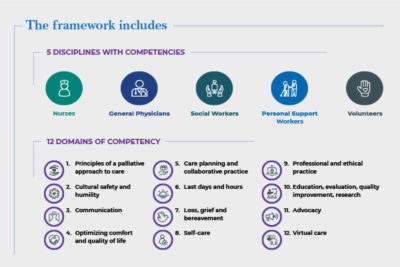*Sponsored content
People living in Canada need health-care providers with the necessary skills and knowledge to address their palliative care needs – whenever and wherever palliative care services are required, be it in hospital, hospice or the home. However, access to early and integrated palliative or end-of-life care varies dramatically from large urban centres to rural and remote communities, and only 15 per cent of people who want to die at home are supported to do so.
“High-quality palliative care provides the physical, psychosocial and spiritual support people and their families or caregivers need as they navigate some of their most challenging life events,” says Dr. Craig Earle, Chief Executive Officer of the Canadian Partnership Against Cancer (the Partnership).
“At present, there are not enough health professionals across Canada with the necessary skills and knowledge to deliver high-quality palliative care in all settings and jurisdictions.”
The Canadian Interdisciplinary Palliative Care Competency Framework
The Canadian Interdisciplinary Palliative Care Competency Framework was developed by an extensive network of palliative care experts and stakeholders, Health Canada and the Partnership to help educators and health-care administrators build palliative care capacity and competency across Canada.
The framework builds on existing provincial frameworks and aims to inform national standards by setting competencies in essential skills, knowledge and abilities for palliative care practice across five disciplines – nursing, medicine, social work, personal support work and volunteering. Competencies are organized under 12 domains of practice and can be applied both for those who specialize in palliative care and those who wish to integrate its principles into their discipline.
The competencies have been written to ensure providers understand the importance of delivering culturally appropriate palliative care that respects the needs and priorities of Indigenous peoples. As palliative care may be carried out by family, caregivers and community members, engagement with First Nations, Inuit and Métis Elders, Knowledge Carriers and community members is underway to share approaches to palliative care and identify tools and practices that could be helpful for other communities and organizations. The engagement is also an opportunity to identify shared priorities for palliative care in communities.
To live well with cancer, individuals and families need support for the physical and emotional symptoms that can make the cancer experience so difficult. Adoption of this framework will help to establish equitable access to palliative and end-of-life care across Canada, advancing the Canadian Strategy for Cancer Control and integrating palliative care in all cancer care settings.
How to use the framework
The framework will serve as the foundation on which national professional organizations and universities and colleges can build comprehensive palliative care programs for the professional communities they serve. It includes discipline-specific self-assessment tools and education resources to help care providers and policy-makers assess competencies, identify learning needs and monitor progress toward providing high-quality palliative care in multiple settings.
The framework will benefit:
- Individuals, managers and human resources personnel who need to fill skills’ gaps and guide hiring practices.
- Educators who want to identify minimum standards for palliative care competencies, weave the development of essential skills into existing curricula or build new curricula to teach the competencies.
- National accreditation and regulatory agencies that are establishing minimum national standards in palliative care.
The competencies in this framework are by no means the end of Canada’s palliative care journey. While it is designed to serve as a high-level guide for all jurisdictions, the framework will evolve with the practice of palliative and end-of-life care to meet the needs of those who use it and those who would benefit from palliative care in Canada. For example, other discipline-specific competencies may be integrated into the framework in the future.
Access the framework and self-assessment tools at www.partnershipagainstcancer.ca/palliative-care-competency-framework
The 2019-2029 Canadian Strategy for Cancer Control (the Strategy) is a 10-year road map to improve equity in the cancer system and cancer outcomes for all people in Canada. As steward of the Strategy, the Partnership and its partners are working to deliver information and supports for people living with cancer, families and caregivers by addressing the limited and unequal access to palliative and end-of-life care across the country.





